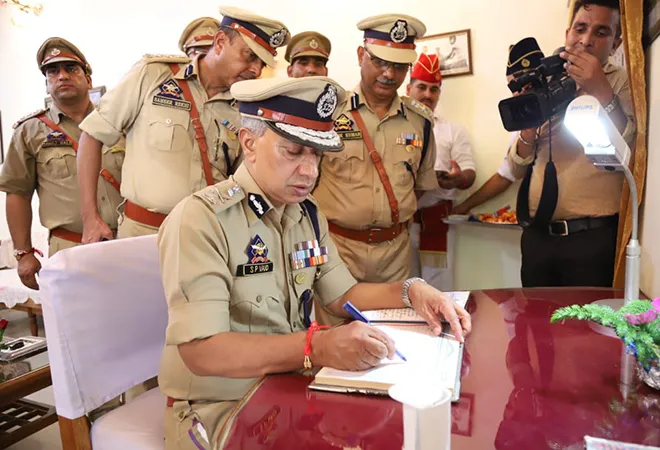-
CENTRES
Progammes & Centres
Location

The hasty removal of SP Vaid as the Director General of Jammu and Kashmir police once again reveals the chronic ad hocism with which the State and Central governments are running the affairs in Jammu and Kashmir. If the abduction of the family members of the policemen by terrorists served as a moral and psychological defeat to the police force, the unceremonious removal of Vaid served as another blow to the force. More importantly, the government was in such a hurry to remove Vaid that it took the decision in contravention to the guidelines laid out by the Supreme Court of India.
Vaid’s transfer order came out at the midnight on 6 September, suggesting the powers at the helm could not bear him in office for another day. It is not clear what difference it would have made if the order would have come out the next morning. Or if the officer was allowed to hold the charge for a few more days till a permanent arrangement for his replacement was made. Perhaps the battle of egos in the Governor house overpowered logical reasoning to the extent that the government was willing to commit contempt of the court.
Thus far, the official reasons for the removal of the police chief are shrouded in mystery and twisted and turned by the press. The State government is yet to give a solid reason for the sudden transfer of SP Vaid. Reportedly, the detention of Hizbul Mujahideen chief Riyaz Naikoo’s father by the police and the subsequent abduction of families of J& K cops led to his removal. However, Vaid has publicly denounced this theory stating that “he did not order the controversial detention of militant commander Riyaz Naikoo’s father.” In fact, Vaid has also claimed that he was not even asked to present his case or informed about his transfer beforehand. Clearly, the decision to remove him was arbitrary, without solid grounds which is now seen as a “gross contempt” of the Supreme Court.
Pertinently, there is no major policy change in the police force after the appointment of an interim DGP. The government could have followed the mandated guidelines and let Vaid remain in the office till a replacement was available as per the due process.
In the case of Prakash Singh & others vs Union of India, others, the Supreme Court, while laying out guidelines for appointments and postings in the State police departments, had come down heavily on the tenure of the police officers stating the transfers on arbitrary or flimsy grounds was demoralising. The court said the DGP should have a minimum term of two years and laid grounds for the removal:
“And, once he (DGP) has been selected for the job, he should have a minimum tenure of at least two years irrespective of his date of superannuation. The DGP may, however, be relieved of his responsibilities by the State Government acting in consultation with the State Security Commission consequent upon any action taken against him under the All India Services (Discipline and Appeal) Rules or following his conviction in a court of law in a criminal offence or in a case of corruption, or if he is otherwise incapacitated from discharging his duties.”
SP Vaid was appointed as the DGP on 31 December 2016 and his two year term would have come to an end on 31 December this year. So, in this case, the State government has clearly violated the guidelines of the court, removing him before his term ended. In fact, there are allegations that the security commission was not consulted and Vaid was removed without any charge. A pleading in the Supreme Court stated Vaid’s removal was a “gross contempt” of the court.
In July this year, the Supreme Court had issued an order which in strong words barred the practice of appointing an “interim” or “acting” Director General of Police. The court order stated: “None of the States shall ever conceive of the idea of appointing any person on the post of Director General of Police on acting basis for there is no concept of acting Director General of Police as per the decision in Prakash Singh’s case”.
Still, in another contravention of the Supreme Court orders, the government appointed an acting DGP in the State. As per the July 2018 order of the apex court, the State government is mandated to propose a panel of names to the UPSC at least three months before the date of vacancy; the UPSC then vets the panel in accordance with the Prakash Singh judgment and returns the shortlisted names to State. The State has to appoint a DGP from these names selected by the UPSC. While the state government has sent a panel of 5 names to the UPSC, by temporarily appointing Dilbagh Singh, who happens to be the junior most of the 5 names and has also been previously suspended for his involvement in a corruption scandal, the state has indicated its choice. Thus, it has presented the UPSC with a fait accompli. Instead of following the due process, the government appointed an interim DG and sought an exception from the Supreme Court stating the law and order and insurgency problem in the State.
The more pressing issue at hand is the arbitrariness with which the system in J&K seems to be working at a time when the law and order and security situation is hitting a new low every week. For the head of force be removed on flimsy grounds at a time when it is facing a brutal assault doesn’t assuage the festering wounds caused by the recent abductions and unabated targeted killings.
The Governor’s administration needs to wake up to the challenges at hand without confusing the Kashmir valley for the jungles dominated by Veerappan. The reactionary firefighting and arbitrary decision making is only giving impetus to the worsening situation. The policymakers need to set aside the hyper-inflated egos for the larger good and it is imperative for all arms of the State to work together to formulate a grand plan to control the damage.
The views expressed above belong to the author(s). ORF research and analyses now available on Telegram! Click here to access our curated content — blogs, longforms and interviews.

Khalid Shah was an Associate Fellow at ORF. His research focuses on Kashmir conflict Pakistan and terrorism.
Read More +